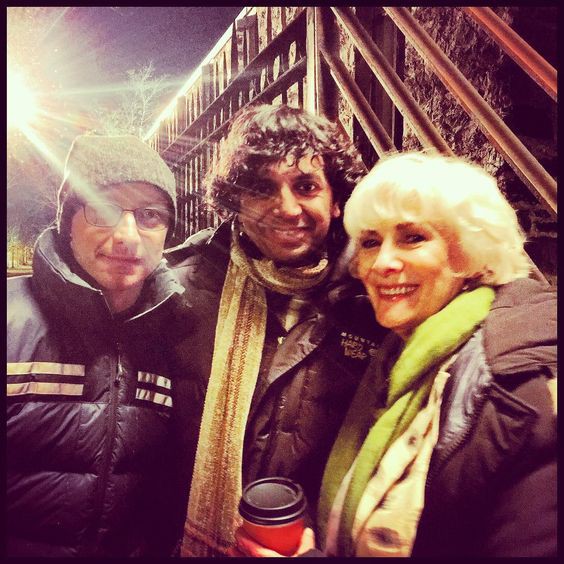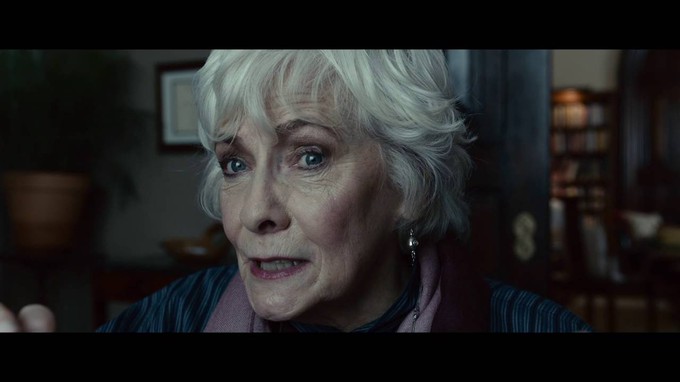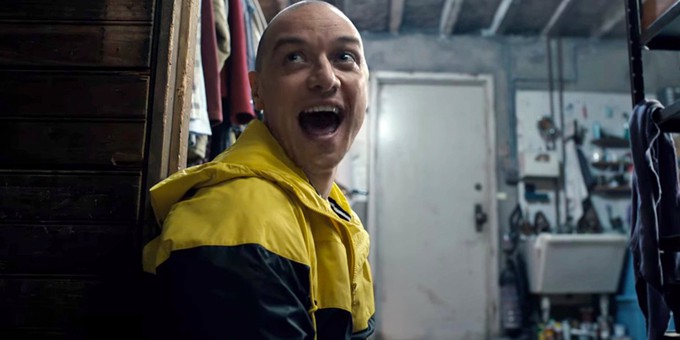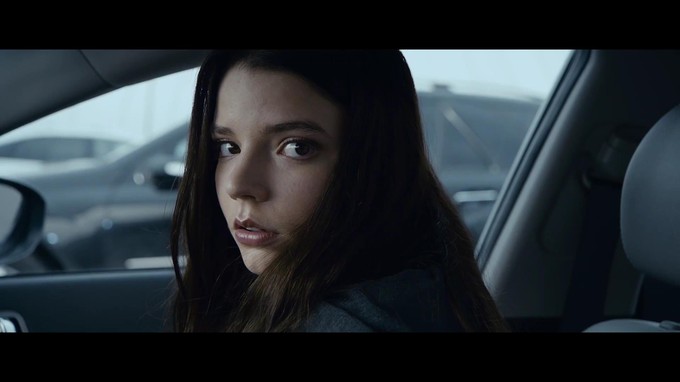Ahoy, squirts! Quint here. I had the chance to sit down with M. Night Shyamalan after the recent AFI screening of his new movie, Split. Now, the flick doesn't come out until late January, so this is a chat that's a bit in advance of release, but it's a nice insight into Night's creative process.
We talk quite a bit about his writing process, both on Split and in general, and he's very upfront about the ups and downs and even describes a structural error he made on Split that resulted in a whole storyline removed from the finished cut.
Even though you won't be able to see the movie for another month and a half I think you're safe to read the below. We don't talk too much about the plot, so as long as you know it's about a guy, played by James McAvoy, with many different personalities kidnapping three girls you'll be okay.
One other thing to know... I walked into this interview wearing a Back to the Future T-shirt (this one) and Night's face lit up. As I turned on the recorder he was talking about his love of the first film, which kinda ties into what we end up talking about in a weird roundabout way.
Enjoy!

M. Night Shyamalan: The first (Back to the Future) is like religion for me. I remember seeing it when I was a kid and I remember just how I felt when I walked outside. I was like, “What just happened to me?” It's so great.
Quint: I actually really like Back to the Future II. I think it was the first time I realized a sequel could play with what you expected from the first movie. I thought it was really clever how they go back to 1955 and it's even more complicated because you have two Martys running around.
M. Night Shyamalan: It's funny you're wearing that tee-shirt because I was thinking about Back to the Future this morning. I was thinking about its tone. It has a tone that can't be imitated. It's kitschy, but not so over-the-top. Zemeckis was just on the money, man.
Quint: And so confident.
M. Night Shyamalan: So confident.
Quint: There's no half-measures in that movie. He takes what could easily be a silly premise and embraces it so authentically that it doesn't ring false. Most people I think would second guess themselves, especially with having to recast a few weeks in.
M. Night Shyamalan: Yeah, the clip that was on was when Doc Brown is showing him the remote control and Michael J. Fox is recording with the camcorder and the car starts revving. The look he gives to Doc... ah, it's just awesome.
I'm so astonished by the first Back to the Future because in my mind it's never been replicated, that tonality. That director, that crew, that actor.
Quint: We could talk all day about Back to the Future, but I'm pretty sure the publicists will be a little peeved if we don't get to the topic at hand. Last night was the second time I saw Split. I was in the Fantastic Fest audience at the very first screening.
M. Night Shyamalan: Oh, great!
Quint: I was excited to watch it again because what's great about the “surprise” of the movie is that it's not some “ah-ha! I fooled you!” twist, but something small that makes you recontextualize the film on second viewing. I don't know how much we can talk about that kind of approach without spoiling the movie...
M. Night Shyamalan: There's ways we can talk about it, sure. When I'm writing there's always a feeling that the story story is flowering, it's unfolding. Even when I'm writing I'm trying to understand it. Different plot points come in at different times, but say for instance, and I'm making stuff up right now, say there's a wife getting ready and she hears her husband talking through the bedroom door. She sees his cell phone is here. In that set-up I just made up, I want to know everything about these two people. As I'm discovering it it's unfolding for myself, too, and when I get why of what's happening... Already in that set-up there's perhaps already a sleight of hand, which could be she's actually worried about him uncovering something about her, you know?
She opens the door and the husband is staring at the wall, but talking. He's like “No, I was just going over a speech.” As you start to unfold it you realize, “Oh, he's doing a speech because he's a corporate guy who goes into companies and teaches motivation.” You ask yourself why would he be saying he's making a speech and you just learn and learn. That's so much fun.
For me, structure is all an extension of character. Plot should come out of character. What is the larger gestalt above what you're seeing? Is there another one on top of that? Where does it fit in to that larger language. Hopefully as it unfolds it sets the rules. For me it should feel inevitable, surprising and inevitable. But the inevitable part of it is critical.
Quint: It sounds a little like you write like Stephen King does. He says he never outlines, he'll just sit at the keyboard and let the story unfold as it will.
M. Night Shyamalan: It's a little bit different because Stephen King writes novels, which gives him a lot of runway to let it unfold. The beauty is you're experiencing the unfolding with the author. The problem is that screenplays are structure. They are structure, that's what the format is. Haiku has a format and so do screenplays. In terms of a graph of character and plot, screenplays lean heavily one way and novels can lean the other way, so you have the luxury to do that.
But I do do this in the outline stage. Right now I'm outlining a new movie and the discovery is happening there. Why am I feeling this? If you're feeling suffocated it usually means you've gone down the wrong road. The unfolding and learning for me is the fun of it. I love learning what it wants to be, but you have to listen and let it tell you.
Quint: The sky's the limit at this stage, right? Then it's just about finding the structure of it.
M. Night Shyamalan: Yeah. There's a whole part of Split that's not in the movie. There's a whole relationship between Betty Buckley's character and her neighbor that's not in the movie. That was a screenplay structure error from me and I couldn't see it until I saw the whole movie. Betty and the other actor gave incredible performances, so it's even more obfuscated because they were phenomenal together. It was very funny, but structurally (it didn't work.) They were talking about the world of D.I.D. (Dissociative Identity Disorder), but they weren't specifically talking about this case: Kevin Wendell Crumb. She was trying to get information for this case, but they weren't saying “This is how you solve this case.”
The reason it's not there is because that doesn't really interest me. That trope of cracking the case on the side feels more common, so I was avoiding it and was presenting a more unusual relationship. But that's an example of how in a novel that would have been perfect. It was would have been rich and told you more about Dr. Fletcher and her personal life and how she relates and all, but film is unforgiving.

Quint: Film's an interesting storytelling artform because an audience can and will fill in the blanks. At least for me I never felt like I needed to see Dr. Fletcher figure him out. I think it's pretty clear in her sessions with Kevin that she's got a good handle on him and what he's capable of.
M. Night Shyamalan: That's not what those scenes were, the ones I shot. They were about her personal life. She had a crush on this guy in the building and she's a very lonely lady. She had unrequited feelings and was very lonely, so she started asking herself why was she so interested in D.I.D. Was it because they were never alone? I thought it was very interesting that the champion of D.I.D. is actually a lonely old woman.
For me that was really beautiful, but it was a novelistic thing and not a filmic thing.
Quint: One of my all-time favorite movie moments is in Richard Donner's Superman. It's a small thing, but an important moment when Christopher Reeve as Clark Kent is gathering up the courage to tell Lois that he's Superman. He takes off his glasses, his body posture is that of Superman and when he loses the nerve he effortlessly, in one single shot, transitions back to Clark Kent's body language and mannerisms. I've never seen someone else pull something like that off as well until I saw James McAvoy in your movie. There a few moments where you have him transitioning between identities without cutting. Obviously you knew he was a good actor before you cast him, but when you saw him transition between distinct identities in front of your eyes did you feel a huge amount of relief?

M. Night Shyamalan: I had suspicions right away. When we were Skyping back and forth when he was in London we were kind of rehearsing, talking through the characters. First of all, he's Scottish, but everybody thinks he's British because he's done so many British accents in his life. I was like, “You're not British?!?” I thought “One of the characters should be British. We should give somebody a British accent.” We thought maybe it was Orwell, the erudite, but then I thought maybe it should be Patricia. “Could you just read me one of the speeches (with that accent)?” Right away we knew that was it.
We struggled with Hedwig (the 10 year old boy personality) for a bit. There's always a thing, you know, either a posture or an accent or, like, Nicole Kidman's nose in The Hours, where suddenly they go click. As soon as I went “Maybe he has a lisp” I heard his voice change and he found Hedwig. It was like that, finding each character one by one by one.
There's a big scene were go transforms between character, when they're all reaching for the light, and we reshot it. He was exhausted when we did it the first time. It was the end of the original shoot and it was so challenging. He has to switch-switch-switch-switch-switch-switch and with aboslutely authenticity and bringing love and passion for each of them.
He got upset... I should have told this story last night (at the Q&A). I'm just remembering it! He got upset and he hit the door, which he thought was a fake door, but it was a solid metal door. He hit it and he broke his hand, but we didn't realize it. He was so angry that he couldn't get this. We did the scene again and again and he couldn't get it perfect.
I said “I think I can cut this together.” As soon as he heard me say that and I heard myself say that, we knew we were coming back.
If you see the movie again, the scene where he's on the train and he's putting on his glasses... you'll see his hand is completely blown up, broken.

Quint: James has the flashy, eye-catching role, but someone I was really impressed with on this second viewing was Anya Taylor-Joy. She's the quiet power of the movie and her arc is something that I more fully grasped on the second viewing. I missed some character tics and moments on the first run-through that I think didn't allow me to appreciate her work as much as I did the second time around.
M. Night Shyamalan: I think it's really fascinating to hear you say that because I felt that and everyone who worked on the movie has felt that. It's kind of her movie. What ends up happening is you get dazzled by the James of it all the first time and he's like a tsunami. You can't see anything past it. But on the second viewing you knew what you were going to get with James, so you can kind of sit in a little bit. You're watching the quietness of her brokenness.
Quint: Thanks for your time, man. I really appreciate it.
M. Night Shyamalan: It was fun talking to you.
Hope you guys enjoyed that chat as much as I did. I especially liked when he started cooking up that random scenario with the husband talking to himself and the wife overhearing.
Make sure to check out Split this coming January. I feel like Shyamalan has found his groove again and has one hell of a dazzling performance from McAvoy to keep it afloat.
-Eric Vespe
”Quint”
quint@aintitcool.com
Follow Me On Twitter

